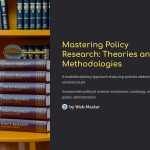 Policy research is an essential field that informs government decisions, business strategies, and societal improvements. Understanding its theories and methodologies enables researchers to evaluate policies effectively and propose impactful solutions. This guide delves into the core principles of policy research, offering insights into its theoretical foundations and methodological approaches. Whether you’re a student, policymaker, or academic, mastering these concepts will enhance your analytical skills and policy influence.
Policy research is an essential field that informs government decisions, business strategies, and societal improvements. Understanding its theories and methodologies enables researchers to evaluate policies effectively and propose impactful solutions. This guide delves into the core principles of policy research, offering insights into its theoretical foundations and methodological approaches. Whether you’re a student, policymaker, or academic, mastering these concepts will enhance your analytical skills and policy influence.

Understanding Policy Research
Policy research is a multidisciplinary approach used to analyze, design, and assess policies that address societal issues. It incorporates fields such as political science, economics, sociology, and public administration. The key objectives of policy research include:
- Identifying social problems that require intervention
- Evaluating existing policies to measure effectiveness
- Developing new policy proposals based on empirical evidence
- Analyzing feasibility considering political, economic, and social factors
Researchers apply both qualitative and quantitative methods, utilizing case studies, statistical models, and comparative analysis to derive meaningful conclusions.

Key Theoretical Frameworks in Policy Research
Several theories guide policy research, each offering a unique perspective on policy formulation and implementation:
1. Rational Choice Theory
This theory assumes that policymakers make decisions based on rational calculations, weighing costs and benefits to achieve optimal outcomes. It emphasizes individual decision-making in policy settings.
2. Institutionalism
Institutional theories focus on how political, legal, and organizational structures influence policy decisions. It explains why policies may persist despite inefficiencies due to institutional inertia.
3. Incrementalism
Proposed by Charles Lindblom, incrementalism suggests that policy changes occur gradually through small adjustments rather than sweeping reforms. This theory explains why major policy shifts are rare.
4. Advocacy Coalition Framework (ACF)
Developed by Paul Sabatier, ACF highlights how coalitions of stakeholders with shared beliefs influence long-term policy decisions, emphasizing the role of ideologies and networks.
These frameworks help researchers analyze how policies emerge, evolve, and succeed or fail.

Research Methodologies in Policy Analysis
Policy research employs diverse methodologies to collect, process, and interpret data:
1. Qualitative Methods
- Case Studies: In-depth exploration of policy impacts in specific contexts
- Interviews & Focus Groups: Gathering insights from policymakers, stakeholders, and citizens
- Document Analysis: Reviewing government reports, laws, and historical records
2. Quantitative Methods
- Surveys & Polls: Measuring public opinion on policy issues
- Statistical Modeling: Using data analysis techniques to forecast policy outcomes
- Cost-Benefit Analysis: Assessing financial implications of policies
Mixed-method approaches, which integrate both qualitative and quantitative techniques, provide a comprehensive analysis of policy issues.

Challenges in Policy Research
Despite its importance, policy research faces several challenges:
- Political Bias: Policymakers may manipulate research findings to justify pre-existing agendas.
- Data Limitations: Incomplete or unreliable data can skew research conclusions.
- Complex Stakeholder Interests: Balancing diverse perspectives complicates policy recommendations.
- Implementation Barriers: Even well-designed policies may fail due to poor execution or resistance.
Addressing these challenges requires rigorous methodology, ethical integrity, and interdisciplinary collaboration.

Case Studies: Policy Research in Action
Examining real-world policy research cases provides practical insights:
- Climate Change Policy: Analyzing carbon taxation impacts using economic models
- Healthcare Reform: Evaluating universal healthcare systems through comparative analysis
- Education Policy: Studying the effectiveness of online learning programs post-pandemic
- Criminal Justice Reform: Assessing the impact of rehabilitation-focused sentencing
These case studies highlight the tangible influence of policy research on societal progress.

Future Trends in Policy Research
The field of policy research continues to evolve with advancements in technology and data analytics:
- Big Data & AI: Leveraging machine learning to predict policy outcomes
- Behavioral Economics: Applying psychology to understand policy compliance
- Digital Governance: Evaluating the effectiveness of e-government initiatives
- Sustainability Policies: Addressing climate change through innovative policy solutions
Staying updated with these trends will be essential for future policymakers and researchers.
*Capturing unauthorized images is prohibited*



